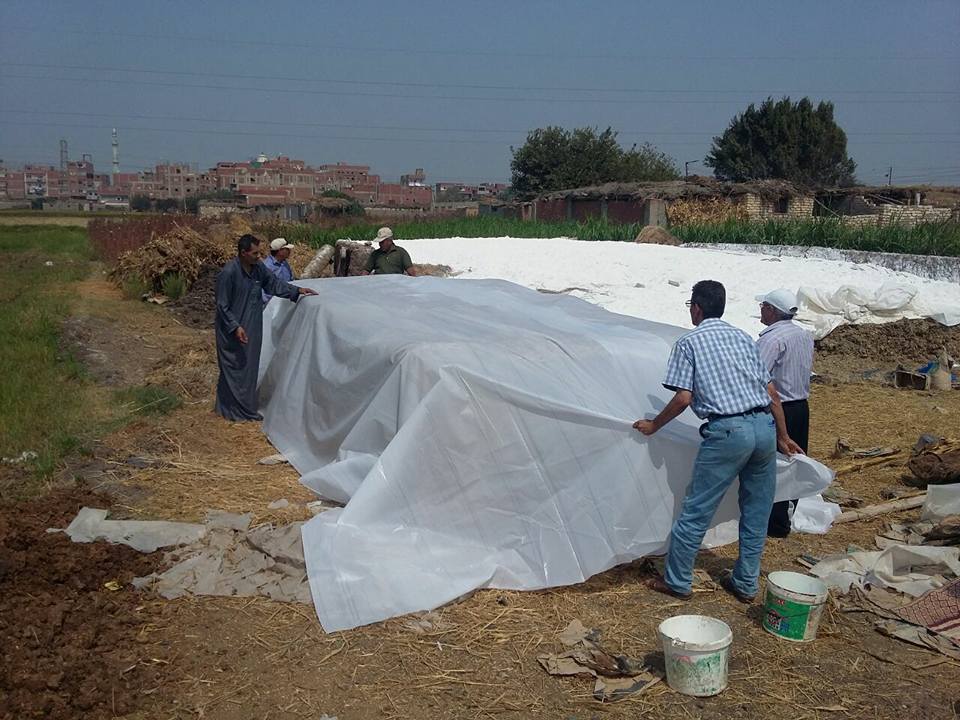By: Sara Mohamed
Follow @saraaashraf3
The Ministry of Environment (MOE) launched an environmental campaign in August and has since then recycled 7,261 tons of rice straw to compost.
This project is part of the Ministry’s efforts to reduce air pollution due to the burning of straw by farmers in Egypt’s governorates, the MOE said in a statement released on September 22.
The statement also provides details of measures taken against violators, in an attempt to curb the practice.
“New legislation was implemented by the government against violators. Fines range from EGP 1000 to EGP 100,000 depending on the severity of the situation,” said Head of the Ministry’s Environmental Awareness Department Amal Taha.
The MOE was able to collect 50,000 tons of rice straw from Kafr El-Sheikh, Behera, Dakahlia, Qalyubia and Sharqia and recycle them to compost and fodder. The target is to collect 350,000 tons of straws and recycle 220,000 by the end of the year.
According to Al-Masry Al-Youm, agricultural workers in Behera and Sharqia confirmed that the rice straw fires were carried out by field farmers to avoid the costs of transporting and storing of rice straw.
Taha told The Caravan that the government encourages the farmers and agricultural workers to sell the rice straw in exchange for money, with one ton costing from EGP 80 to EGP 100.
“After the Egyptian pound floatation, the pesticides, fertilizers, and fodders became expensive for the farmer to buy, so they were obliged to recycle as a source of income,” he added.
The MOE sent out investigation teams to the governorates which inspected 2,046 farms. It stated that 1,213 were suspended and 247 were fined.
Three satellites with tracking sensors were used to detect fires, caused by either burning rice straw or garbage.
The “black cloud,” an annual thick smog that appears in the skies of Cairo and cities on the delta toward the end of the year, has been a recurring phenomenon since the late 1990s.
The cloud is caused by the systematic burning of rice ash by farmers and accounts for nearly 40 percent of Egypt’s air pollution, according to the MOE’s statement.
The Ministry declared that it executed an environmental awareness plan for farmers in these governorates including seminars, meetings, and conferences. It was able to conduct 482 awareness activities till now.
“The government launched a project called [The Small Farmer] in which it teaches the farmers and the agricultural workers how to recycle rice straw into fertilizers, hay, and fodders,” Taha told The Caravan.
AUC’s Sustainability Officer, Yasmin Mahmoud, said that the key toward curbing pollution is awareness of its consequences.
“People need to learn about the environmental issues facing Egypt,” Mahmoud said.
“They need to become aware of their responsibility towards their community … It doesn’t matter how long it will take to become sustainable, the fact that we start to become truly sustainable is what matters.”
The MOE confirmed in its statement that 45 tons of EM1 bio-fertilizers, 150 tons of urea and 50 tons of plastic were provided to the farmers to aid their recycling process.
“We had to provide them with these resources and teach them the appropriate way to use them to recycle the rice straw into fertilizers that would be used in the future and save money,” Taha said.
Moreover, the statement stated that 329 sites were equipped for the collection and pressing of the rice straw. 97 of these sites are used for farmers to work on and in return they could freely rent pistons, tractors and trailers that assess them with the rice straw collection.
Taha added that these equipments are also used in the compression and recycling of rice straw into composts and fodders using the pastic bags, urea, and bio-fertilizers provided as well.
Ahmed El-Adawy, environmental and health manager at Ball Corporation in Egypt, said that recycling measures are already being implemented in Egypt but it needs awareness.
“The recycling rate for aluminum trash in Egypt is 72 percent, whereas in the USA the rate is 64 percent,” El-Adawy told The Caravan.
“There are also NGOs who started encouraging recycling by buying the neighborhoods’ trash including cans, plastic, and glass … “So people just need to know that recycling actually exists in Egypt,” El-Adawy added.
